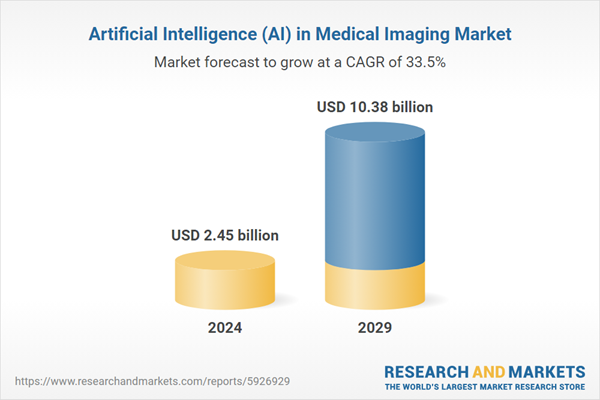As a result of the rising execution of man-made brainpower innovations in the medical care industry, artificial intelligence (AI) in the medical Imaging market growth has developed fundamentally. AI in the medical imaging market size has expanded due to the growing demand for diagnostic tools that are both more accurate and more effective. Key companies own the market share in medical imaging andAI since they are actively developing and integrating AI algorithms into medical imaging systems. Its members include innovation organizations in medical services, producers of imaging hardware, and programming engineers. The market growth has created room for anticipation of further development and innovation that will improve the results of medical imaging.
Introduction:
Artificial intelligence in the medical imaging market is expanding rapidly, and the medical services business is being rethought by changing demonstrative imaging. To improve accuracy, efficiency, and patient outcomes, medical imaging systems are incorporating machine learning and deep learning algorithms.In medical scans like X-rays, CT scans, MRIs, and ultrasound, AI in Medical Imaging market growth enables enhanced image processing, automated interpretation, and the identification of anomalies. These man-made consciousness-fueled innovations can help radiologists and doctors find and analyze infirmities like malignant growth, cardiovascular infection, neurological issues, and outer muscle peculiarities.
AI IN MEDICAL IMAGING MARKET DRIVERS:
- Growing demand for accurate and timely diagnosis of illness:
AI in the Medical Imaging Market Geographical Outlook
- North America is leading in the AI in the medical imaging market.
Reasons for buying this report::
- Insightful Analysis: Gain detailed market insights covering major as well as emerging geographical regions, focusing on customer segments, government policies and socio-economic factors, consumer preferences, industry verticals, other sub- segments.
- Competitive Landscape: Understand the strategic maneuvers employed by key players globally to understand possible market penetration with the correct strategy.
- Market Drivers & Future Trends: Explore the dynamic factors and pivotal market trends and how they will shape up future market developments.
- Actionable Recommendations: Utilize the insights to exercise strategic decision to uncover new business streams and revenues in a dynamic environment.
- Caters to a Wide Audience: Beneficial and cost-effective for startups, research institutions, consultants, SMEs, and large enterprises.
What do businesses use our reports for?
Industry and Market Insights, Opportunity Assessment, Product Demand Forecasting, Market Entry Strategy, Geographical Expansion, Capital Investment Decisions, Regulatory Framework & Implications, New Product Development, Competitive IntelligenceReport Coverage:
- Historical data & forecasts from 2022 to 2029
- Growth Opportunities, Challenges, Supply Chain Outlook, Regulatory Framework, Customer Behaviour, and Trend Analysis
- Competitive Positioning, Strategies, and Market Share Analysis
- Revenue Growth and Forecast Assessment of segments and regions including countries
- Company Profiling (Strategies, Products, Financial Information, and Key Developments among others)
Segmentation
- By Offering
- Software
- Services
- By Technology
- Machine Learning
- Deep Learning
- Computer Vision
- By Application
- Oncology
- Neurology
- Cardiology
- Pulmonary
- Orthopedics
- Others
- By End User
- Hospitals & Clinics
- Diagnostics Image Centers
- Research Institutes
- Others
- By Geography
- North America
- United States
- Canada
- Mexico
- South America
- Brazil
- Argentina
- Others
- Europe
- United Kingdom
- Germany
- France
- Italy
- Spain
- Others
- Middle East and Africa
- Saudi Arabia
- UAE
- Others
- Asia Pacific
- Japan
- China
- India
- South Korea
- Indonesia
- Taiwan
- Other
- North America
Table of Contents
Companies Mentioned
Some of the key companies profiled in this Artificial Intelligence (AI) in Medical Imaging Market report include:- General Electric Company
- IBM Corporation
- Koninklijke Philips N.V.
- NVIDIA Corporation
- Siemens Healthineers AG
- Canon Medical Systems Corporation
- Hologic, Inc.
- Agfa-Gevaert Group
- Aidoc Medical Ltd.
- Zebra Medical Vision Ltd.
Table Information
| Report Attribute | Details |
|---|---|
| No. of Pages | 140 |
| Published | September 2024 |
| Forecast Period | 2024 - 2029 |
| Estimated Market Value ( USD | $ 2.45 billion |
| Forecasted Market Value ( USD | $ 10.38 billion |
| Compound Annual Growth Rate | 33.4% |
| Regions Covered | Global |
| No. of Companies Mentioned | 10 |









